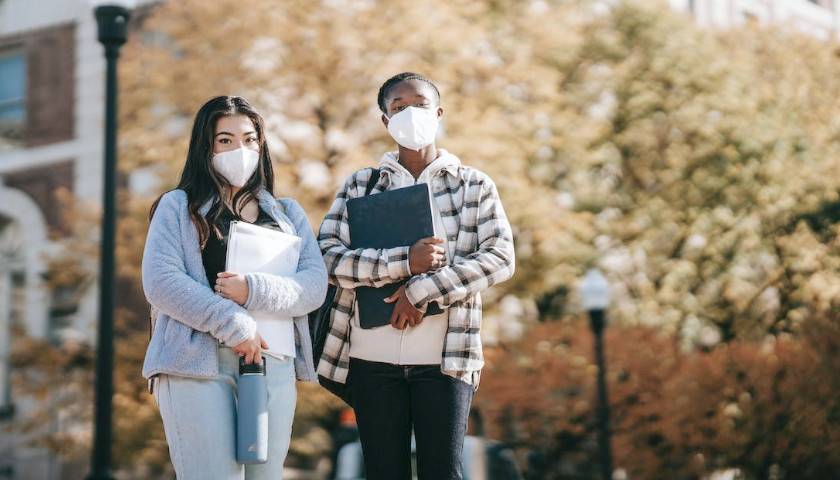by Greg Piper
As public and private institutions resume or consider mask mandates in the wake of a small uptick in COVID-19 hospitalizations and new viral variants, an international research collaborative funded by the National Institutes of Health is facing new scrutiny for how it came to publicly downplay its 17 years of research finding that masks make “little to no difference.”
U.K-based nonprofit Cochrane, often described as the “gold standard” of evidence-based medicine, heavily redacted its internal discussions on how to respond to questions about alleged conflicts of interest that may have shaped its March statement deeming the systematic review’s results “inconclusive” without changing its content.
It turned over largely unreadable documents to former Senate Finance Committee investigator Paul Thacker, now an independent journalist, in response to his request for the “personal data” Cochrane holds on Thacker under Article 15 of the European Union’s General Data Protection Regulation.
The State Department did roughly the same in a Freedom of Information Act production in August, prompted by litigation. It heavily redacted discussions of how to respond to reporters asking about its funding of a group that tries to starve conservative publishers of ad revenue.
“They have no justification” for the redactions, Thacker told Just the News, asking rhetorically why Congress wasn’t scrutinizing a taxpayer-funded organization whose mask research — or perception thereof — has played a pivotal role in U.S. policy. Cochrane says it has received £500K to 1 million from NIH.
Cochrane spokesperson Harry Dayantis said it was “usually illegal” to disclose information “about individuals other than the requester” under this “very specific and limited type of request,” pointing Just the News to the U.K. Information Commissioner’s office.
The Cochrane systematic review, which has evaluated masking first against influenza and then COVID since 2006, posed a problem for the federal government’s ongoing pro-mask guidance, but so does an increasing body of research that questions whether sustained mask use is benign.
Then-CDC Director Rochelle Walensky told Congress the Cochrane study was suspect because it relied on randomized controlled trials rather than the observational evidence the CDC favors, but she also inaccurately claimed Cochrane had “retracted” it. The House Appropriations Committee later fixed the hearing record at the authors’ request.
CDC director gave misleading testimony to Congress
Walensky misled Congress on vaccine effectiveness against viral transmission & falsely claimed that summary of Cochrane study on face masks was "retracted"
READ MORE https://t.co/8nHRZypp4X@DrJBhattacharya @elonmusk @Rep_Clyde pic.twitter.com/Yai3A6RqrB
— Maryanne Demasi, PhD (@MaryanneDemasi) April 20, 2023
Three months later a study funded by the South Korean government, published in the Elsevier journal Ecotoxicology and Environmental Safety, found high levels of “volatile organic compounds” emitted from commonly worn KF94 respirators, some of which crossed the German Environment Agency’s threshold for safe use.
Cochrane editor-in-chief Karla Soares-Weiser released the March statement following critical questions about the study by New York Times columnist Zeynep Tufekci, a Princeton sociologist.
The top-down reinterpretation prompted recriminations from the study’s authors including University of Oxford epidemiologist Tom Jefferson, who has led the oft-updated systematic review from the start and was singled out in Tufekci’s column, titled “Here’s Why the Science Is Clear That Masks Work.”
Soares-Weiser has since taken to communicating with the authors through a consulting firm, Thacker wrote Monday, saying both entities have ignored his questions about the contract.
Jefferson didn’t respond to texts and emails Wednesday seeking the Envoy emails. Envoy didn’t answer emails seeking confirmation of the contract with Cochrane or its purpose, amount and duration, and Dayantis said he didn’t know anything about Envoy.
Unlike FOIA in the U.S., Article 15 does not require holders of personal data to explain the specific legal basis for their redactions. Cochrane’s cover letter to Thacker simply says it can’t share “some of the personal data you requested because disclosure would infringe the rights and freedoms of third parties.”
Cochrane’s record production to Thacker substantially blacked out staff discussions of how to respond to his requests. One page displays portions of just two lines: “Hi All, We have received a number of enquiries from this journalist [redacted]. He now publishes on his blog [redacted].”
Unredacted portions address “Catherine,” referring to board co-chair Catherine Marshall, the target of several Thacker requests, and grouse that Thacker reached out on a U.K. holiday. One of Thacker’s requests itself appears to be blacked out.
Marshall had three COVID-specific contracts with the New Zealand Ministry of Health — two reporting to the deputy chief executive of “COVID-19 Health Response” — from July 2020 through June 2022, according to the ministry’s response to Thacker’s public records request.
New Zealand mandated masks in public places for nearly a year, through fall 2022, after ending its lockdown policies.
5. More conflicts of interest with Cochrane Board Member Catherine Marshall. Here's the latest from a FOIA on her COVID consulting gigs, which are not disclosed on the Cochrane site. pic.twitter.com/zEgb9bkPRQ
— Paul D. Thacker (@thackerpd) August 28, 2023
Thacker asked both Cochrane and Marshall, who is leaving the nonprofit when her four-year term ends in September, to explain why it didn’t disclose Marshall’s contracts.
Marshall’s COVID contracts aren’t mentioned on her Cochrane conflict-of-interest disclosure page, which says she’s only received consulting fees for “advice on the development and implementation of guidelines and the design and delivery of primary care services.”
Thacker asked Marshall what advice she gave the government on masks, whether it ran “counter to Cochrane’s own findings,” and her role if any in the March statement, including whether Marshall’s advice or COVID government contracts played a role.
Jefferson told Just the News Thursday he also requested his personal data from Cochrane under Article 15, receiving “nearly 300 pages of nothing” with “all the important email exchanges” fully redacted. He said he can’t answer other queries by deadline because they have ‘long and complicated answers.”
– – –
Greg Piper has covered law and policy for nearly two decades, with a focus on tech companies, civil liberties and higher education.




